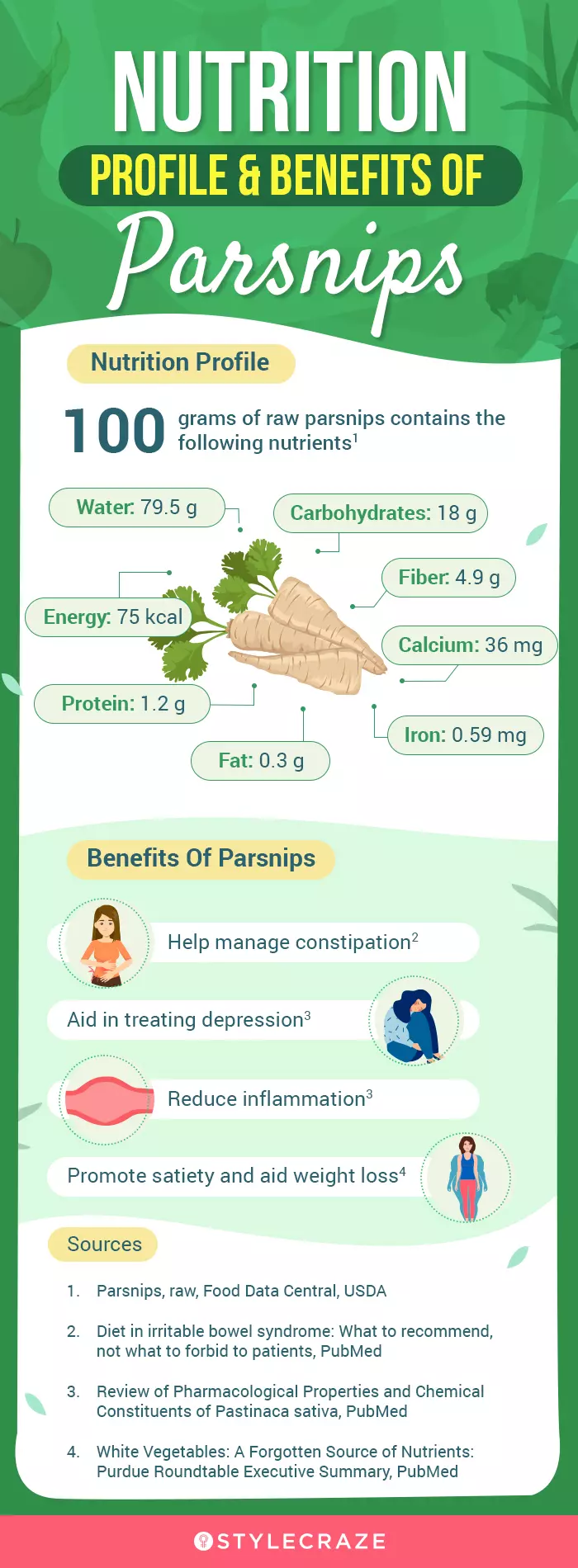How Are Parsnips Good For You?
Parsnips carry a striking resemblance to carrots, and the only way to differentiate them from carrots is their lighter hue (while carrots are a darker orange). A raw parsnip tastes somewhere between a carrot and a potato. It smells like fresh parsley. The goodness of parsnips, like any other food, comes from their impressive nutrition profile. They contain potassium that boosts heart health, and folate that prevents congenital disabilities in newborns. Parsnips are also an excellent source of fiber and do everything that fiber does – enhance digestion, promote eye health, and regulate blood pressure levels. Let’s check out the benefits this wonder root veggie has to offer.
How Can Parsnips Benefit Your Health?
1. Can Boost Heart Health
Parsnips are great sources of potassium, a mineral found to have great benefits for the heart. Adequate potassium intake is also important for the prevention of stroke and coronary heart disease (1). Studies also show that increasing potassium intake can decrease heart disease risk by 17% and increase life expectancy by over 5 years. Low potassium intake has also been identified as a risk factor for hypertension (2). As parsnips contain this mineral in abundance, consuming them can help regulate blood pressure levels – and eventually avert heart disease. The soluble fiber in parsnips can help fight heart disease as it can lower LDL cholesterol levels.
2. Prevent Birth Defects
Parsnips are good sources of folate too, an important nutrient that helps prevent birth defects in newborns. Certain studies show that folic acid (or folate) can cut the risk of birth defects of the spinal cord and the brain by as much as 70% (3). The most dangerous of these birth defects is spina bifida, wherein the baby is born with a part of the spinal cord outside the body.
3. Can Boost Digestion
The presence of soluble fiber makes parsnip an ideal food for banishing your digestion troubles. Soluble fiber helps by cutting the risk of constipation as it retains water and turns into a gel during digestion (4).
4. Can Improve Immunity
Parsnips are rich in vitamin C, a nutrient that helps boost immunity (5). Studies show that vitamin C enhances the immune system – its deficiency has been associated with impaired immunity. Vitamin C is also important in collagen synthesis, thus being a vital nutrient for healthy skin, hair, and nails. Supplementation with vitamin C was also found to treat systemic and respiratory infections (6).
5. May Fight Anemia
Parsnips are rich in folate – and studies show that treatment with folate can help fight megaloblastic anemia (7).
6. May Boost Bone Health
Parsnips boast a rich supply of vital minerals—magnesium, calcium, phosphorus, and manganese, which are essential for bone development (8). Calcium and phosphorus are key in enhancing bone density and structure, preventing fractures, and reducing the risk of osteopenia (9). Additionally, as supported by research, magnesium plays a positive role in bone structural formation (10).
7. May Reduce Risk Of Cancer
Parsnips exhibit cancer-preventive properties, backed by recent research showcasing their anti-inflammatory effects. Studies reveal the presence of falcarinol, an active ingredient in parsnips, which has been shown to locate and eliminate cancer cells in the colon (11). Hence, incorporating this vegetable into your diet may lower the risk of developing colon cancer. These are the ways adding parsnips to your diet can do you a whole lot of good. As we discussed, all of this can be attributed to the nutritional profile of the root vegetable.
What Is The Nutritional Profile Of Parsnips?
Source: USDA Food Composition Databases With such an amazing nutrition profile, who wouldn’t want to make parsnips a part of their daily diet? Check out the recipes in the next section.
Parsnip Recipes
1. Parsnip Puree
1 pound of thinly sliced parsnips ½ cup of heavy cream ½ cup of 2% milk (may use whole milk) 2 thinly sliced garlic cloves 2 tablespoons of unsalted butter Kosher salt
2. Butter Fried Parsnips
6 peeled parsnips, quartered lengthwise ½ teaspoon of seasoning salt ½ cup of melted organic butter ¼ cup of all-purpose coating
Mark, a blogger, shares insights into growing parsnips, discussing the love-hate relationship people have with this vegetable. He mentions, “Parsnips roasted in some lard until they are golden are amazingly good, and cooked as chips in our Actifry machine they are, as the saying goes, “To die for!” (i)” In a survey done on 1,640 adults in Great Britain, people were asked about their preferred Sunday roast. Of all, 49% favored roast parsnips, 2 percent preferred boiled parsnips, and the majority of 89% opted for roasted potatoes. The other most preferred options were gravy, Yorkshire pudding, boiled broccoli, etc. Absolutely delectable dishes, aren’t they? Quite simple to prepare and extravagantly nutritious too! We are sure you can’t wait to head to your kitchen right away. Hold on – there is something else about parsnips you’ve got to know.
Do Parsnips Have Any Side Effects?
Parsnips may cause allergies in certain individuals. Such people may also experience contact dermatitis. Rashes or a burning sensation on the lips, mouth, and throat are some of the possible side effects. If you experience any of these effects, please stop consuming it and visit your doctor. Avoid parsnip leaves. Just stick to the root. The leaves can cause skin blistering. Avoid wild parsnips. These are found in open areas, fields, and pastures. They have yellowish-green flowers appearing in umbrella-shaped clusters, usually in June and July. Please avoid them at all costs as they are toxic. Livestock eating wild parsnips were found to experience negative effects on their fertility and weight (12). Are parsnips better than potatoes? Possibly. There is a higher level of dietary fiber and minerals such as phosphorus, zinc, copper, and magnesium found in parsnip. It also contains vitamins B1, B5, K, E, and folate. However, potato benefits can’t be understated as well. They are a good source of potassium, iron, and vitamins B3, B6, and C and have a lower glycemic index (9), (10). Are parsnips a superfood? Yes. Parsnips are a good source of carbohydrates, dietary fiber, vitamins, and minerals that make them a nutritionally dense superfood. Is parsnip anti-inflammatory? Yes. Parsnip contains compounds such as angelicin that have anti-inflammatory properties. It inhibits nitric oxide production in macrophages (11). Are parsnips healthier than carrots? Possibly. Parsnip contains 85.5% less sodium compared to carrots and contains more iron, potassium, magnesium, copper, zinc, and phosphorus (10), (12). Is parsnip good for arthritis? Possibly. According to anecdotal evidence, parsnip’s anti-inflammatory compounds may help provide relief from arthritis. Which is better: a turnip or a parsnip? Parsnip. It is richer in vitamins, minerals, and dietary fiber than turnips (10), (13). Are parsnips good for weight loss? Possibly. Parsnips have fewer calories and are richer in dietary fiber. The fiber content may help you feel satiated and reduce weight (10), (14). Are parsnips high in sugar? Yes. Parsnips contain about 7.5 g of sugar per 100 grams (10). Are parsnips keto-friendly? No. The high carb content of parsnips makes them unsuitable for keto diets (10). Parsnips are known to have unexpected health benefits. Take a look into its nutritional wonders and see how best you can incorporate parsnips into your diet for a healthier lifestyle. Click here to watch the video!
References







